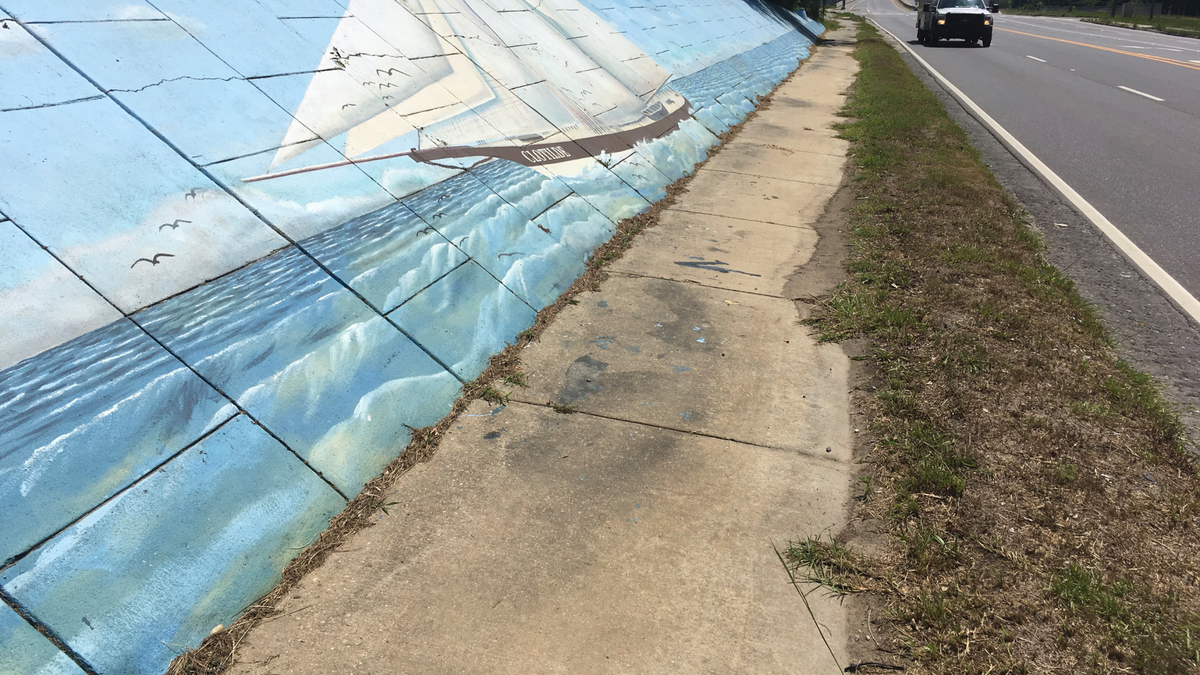
Traffic passes a mural along Africatown Boulevard in Mobile, Alabama, on Thursday, May 30, 2019. An archaeological report will be released Thursday, May 30, 2019 on the discovery of what experts believe is the last ship known to have brought enslaved people from Africa to the United States. The event in the Africatown community of Mobile also will include a community celebration and commemoration event marking the discovery of the schooner Clotilda , according to the Alabama Historical Commission. (AP photo/Kevin McGill)
MOBILE, Ala. – The Latest on events commemorating the discovery of the wreckage of a slave ship in waters near Mobile, Alabama, (all times local):
4:30 p.m.
A ceremony heralding the discovery of a sunken cargo ship that once carried enslaved Africans to the Alabama Gulf Coast was marked by celebrations of science — and talk of renewed hope for racial justice.
It happened Thursday afternoon in the Mobile, Alabama, community known as Africatown. That's where numerous people freed after the Civil War settled. Many of them were survivors of a trip aboard the Clotilda, believed to be the last ship that brought enslaved people from Africa to the United States.
Experts in history, diving and archaeology discussed the painstaking process that led to the confirmation that the Clotilda had been found. Descendants of the ship's human cargo expressed hope that the discovery will revive talk of racial equality and economic justice, including revitalization of the Africatown area.
___
1 p.m.
People are gathering at a small community center in Mobile, Alabama, to learn more about the discovery of what experts believe is the last ship known to have brought enslaved people from Africa to the United States.
Thursday's event centered on the finding of the wreckage of a schooner called the Clotilda. It's taking place in Mobile's Africatown community. That's an area where people freed after the Civil War settled — including some who survived the trip aboard the Clotilda.
Last week, the Alabama Historical Commission said teams of experts said evidence shows the wreckage of the 19th century schooner found in murky Mobile River waters is likely the ship.
An archaeological report on the ship was to be released Thursday in Africatown, followed by a community celebration of the discovery.
___
7 a.m.
Experts are set to release details on the discovery of the last ship known to have brought enslaved people from Africa to the United States.
Officials announced last week that evidence shows the wreckage in murky waters of the northern Gulf Coast is likely that of the Clotilda. Historians say the wooden schooner was used in 1860 to illegally transport 110 people from west Africa to Mobile. It was scuttled and burned to destroy evidence of the illegal voyage.
Thursday afternoon's event is planned in the Africatown community of Mobile, which is home to descendants of the Clotilda captives. The Alabama Historical Commission says an archaeological report on the Clotilda will be released at a news conference. A community celebration of the discovery will follow.

